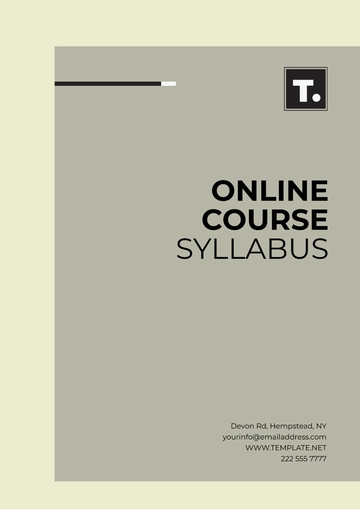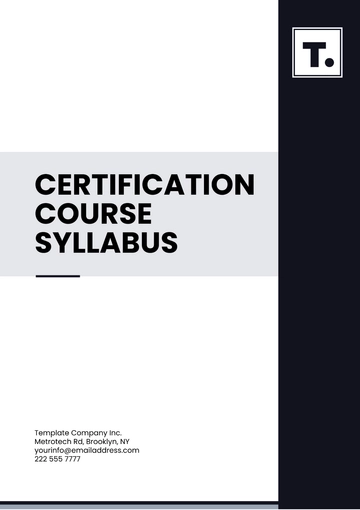Free Animal Physiology Syllabus

Course Description
This course covers the foundations of animal physiology including cellular operations, digestion, metabolism, and the nervous, endocrine, circulatory systems in animals. Students will also examine the fluid balance and excretion attributes in animal bodies.
I. Course Objectives
Understanding Cellular Physiology: Explore the fundamental principles of cell structure and function, focusing on cellular membranes, transport mechanisms, and metabolic processes.
Exploring Organ Systems: Investigate the structure and function of major organ systems in animals, including the nervous, muscular, circulatory, respiratory, digestive, and excretory systems.
Analyzing Integrative Physiology: Examine the integration of physiological processes at the organismal level, emphasizing the coordination between different organ systems to maintain overall homeostasis.
Studying Physiological Adaptations: Investigate how animals have evolved physiological adaptations to diverse environmental challenges, such as temperature extremes, altitude, and osmotic stress.
Applying Quantitative Methods: Develop proficiency in using quantitative methods, including data analysis and experimental techniques, to investigate physiological phenomena and interpret experimental results.
II. Instructor Information
Dr. [YOUR NAME], [YOUR COMPANY NAME]
Email Address: [YOUR EMAIL]
III. Course Materials
Required Textbook:
"Principles of Animal Physiology" by Christopher D. Moyes and Patricia M. Schulte
Supplementary Resources:
"Animal Physiology: From Genes to Organisms" by Lauralee Sherwood
"Comparative Animal Physiology" by Knut Schmidt-Nielsen
Online Resources:
Access to online journal articles and multimedia resources via the university library website.
IV. Course Structure
Lecture Schedule:
Week | Topic |
|---|---|
1 | Introduction to Animal Physiology |
2 | Cellular Membranes and Transport |
3 | Cellular Energetics and Metabolism |
4 | Nervous System Physiology |
5 | Muscular System Physiology |
6 | Cardiovascular System Physiology |
7 | Respiratory System Physiology |
8 | Digestive System Physiology |
9 | Excretory System Physiology |
10 | Endocrine System Physiology |
11 | Reproductive System Physiology |
12 | Integrative Physiology and Homeostasis |
13 | Physiological Adaptations |
14 | Review and Course Summary |
Laboratory Schedule:
Laboratory sessions will complement lectures by providing hands-on experience with experimental techniques, data analysis, and physiological measurements.
V. Assessments
Examinations:
Midterm Examination (Week 7)
Final Examination (Week 15)
Laboratory Reports:
Weekly laboratory reports based on experimental activities and data analysis.
Quizzes:
Periodic quizzes to assess understanding of lecture material.
Class Participation:
Active participation in class discussions and laboratory sessions.
VI. Grading
Criteria | Percentage |
|---|---|
Midterm Examination | 20% |
Final Examination | 30% |
Laboratory Reports | 25% |
Quizzes | 15% |
Class Participation | 10% |
Total | 100% |
VII. Policies
Attendance Policy:
Regular attendance is expected for all lectures and laboratory sessions. Absences should be communicated to the instructor in advance, with valid reasons documented.
Late Submission Policy:
Late submissions for laboratory reports will incur a penalty of 10% per day, unless prior arrangements have been made with the instructor.
Academic Integrity:
Students are expected to uphold the highest standards of academic integrity throughout the course. Plagiarism or any form of academic dishonesty will not be tolerated and may result in severe penalties, including but not limited to failure of the course.
Accommodation Policy:
Students with documented disabilities or special needs requiring accommodation should contact the instructor to make appropriate arrangements.
VIII. Additional Resources
Office Hours: Take advantage of the instructor's office hours for additional assistance with course material, clarification of concepts, or discussion of any concerns.
Study Groups: Form study groups with fellow classmates to review lecture material, discuss laboratory findings, and prepare for assessments collaboratively.
Disclaimer
The syllabus for this academic course is not set in stone and may witness changes periodically. All students must take note that the course instructor holds the authority and reserves the complete right to adjust, modify, or revise this document whenever deems necessary during the span of the entire course.
- 100% Customizable, free editor
- Access 1 Million+ Templates, photo’s & graphics
- Download or share as a template
- Click and replace photos, graphics, text, backgrounds
- Resize, crop, AI write & more
- Access advanced editor
Introducing the Animal Physiology Syllabus Template from Template.net. This customizable and editable template is designed to streamline your course planning process. Tailor it to fit your curriculum seamlessly with our Ai Editor Tool. Achieve efficiency and clarity in presenting essential topics with this versatile resource.





























